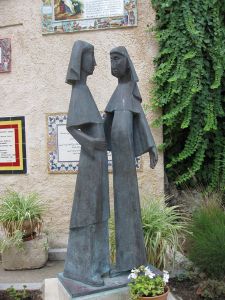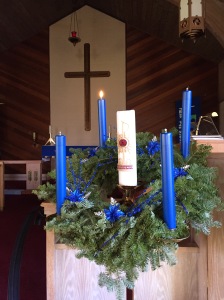First Sunday of Advent, year B, 12/3/17
First reading: Isaiah 64:1-9
Psalm 80:1-7, 17-19
Second Reading: 1 Corinthians 13-9
Gospel Reading: Mark 13:24-37
To be quite honest, I was hoping to be done with the “end of the world” readings. This past month leading up to Christ the King Sunday is SUPPOSED to be “end of the world,” because it’s the end of the Church year, but now we’re in Advent. But once again, Jesus is confronting us with “the end.”
We should be on our way to Bethlehem, not Jerusalem. We are four weeks away from Jesus’ birth, and this passage is two days away from Jesus’ death.
I was railing against this earlier in the week, when my husband reminded me that EVERY Advent 1 we begin at the end. I had forgotten.
Maybe it’s because world and national events have been especially difficult lately, that I was really hoping for a break.
The worst hurricane season on record, the devastation to the Caribbean, Texas, Florida, and especially Puerto Rico. The fires in the West which have destroyed the lives of thousands, even in they escaped physically unharmed.
Terrorist attacks in Barcelona, Iraq, Afghanistan, Nigeria, Yemen, Somalia, Philippines, Pakistan, England, and New York City, where we lost one of our own townspeople.
Horrifying gun violence on our streets and in Las Vegas and Texas. Civil unrest in Charlottesville and wherever racism rears its ugly head.
I don’t want more “end of the world,” I want a cuddly baby. But we’re not getting one. At least not today.
Perhaps we read from near the end of Mark on this first Sunday of Advent because the messages Jesus gives is appropriate.
Jesus stresses “keep alert,” or “keep awake” 3 times in the last 3 verses, with good reason.
I think what Jesus is trying to tell us, is that if we don’t slow down and pay attention – when he DOES come, we’ll miss him.
Now, we could talk about keeping alert for the darkening sun and moon and for the falling stars. We could talk about the “‘Son of Man coming in clouds’ with great power and glory” and the angels.
Many preachers and people of faith focus on the apocalyptic parts of the passage to make predictions about when the end will come. The people who were the first to read (or hear) Mark’s gospel certainly could relate.
For them, the destruction of the Temple was current events, and the persecution of Christians meant more than having to say “happy holidays” – it meant death.
For them, Jesus’ declaration, “Heaven and earth will pass away, but my words will not pass away,” was in the tradition of the greatest prophets, calling the people back to faith.
But what do these words mean for us, thousands of years on from the time Jesus shared them with the original disciples?
The key for “the END” for us is in verse 32: “About that day or hour no one knows, neither the angels in heaven, nor the Son, but only the Father.”
We aren’t called to stand on street corners holding signs “the end is near.” We certainly aren’t called to make predictions of the end. We aren’t called to separate ourselves from society, sell all that we own, and wait on some mountain like a doomsday cult.
Jesus calls us to “keep alert” and “keep awake” not only for the end of all things (as if we could miss the sun going dark and stars falling from the sky!), but for how to live our lives UNTIL that day.
“It is like a man going on a journey, when he leaves home and puts his slaves in charge, each with his work, and commands the doorkeeper to be on the watch.”
Jesus is not physically with us right now, but he has left us – his slaves, his servants, his disciples – in charge – each with our own work.
What does that mean? What IS our work? And how do we “keep awake and alert” until our master returns?
Our work, brothers and sisters, is to live faithful lives every day – to go about our business, loving God and neighbor in word and deed, until he comes again – whenever that may be.If we have a job, we go to work and are diligent in our working – whether we’re a grocery clerk, a cashier, a teacher, a business executive, or congressman.
If we have a job, or we’re in school, retired, and even if we don’t get around much anymore, our work includes serving our neighbor in Jesus’ name.
It means being kind to those who we see are struggling – sitting with the new kid in school, or the one who has no friends. Reassuring the mom in Target whose little one is having a meltdown. At this time of the year especially, being kind to those working in the retail industry.
Remembering those who might be dreading Christmas because of poverty or broken family relationships.
When we remember what Jesus told us in last week’s gospel – that whatever we do to the least of these, we do to him – then loving our neighbor in word and deed is the best way we can keep awake, and be alert when the master comes.
Because in reality, the master is with us all the time, is here even now as we look into the faces of each other.
Are we awake to this – or are we sleepwalking through our days?
Because keeping awake doesn’t just mean looking for the stars to fall from the sky – it also means feeding the hungry, welcoming the stranger, being a shoulder to cry on, and praying for our enemies.
It’s kind of exhausting honestly. Kind of why I wanted our gospel today to be warm and fuzzy.
But instead, it’s a good reminder that Advent isn’t just about the baby Jesus – but also about baby Lisa, baby Ellen, baby Michael, baby Vivian, baby Tom (mentioning those present by name) – and ALL of God’s children.
AMEN.


